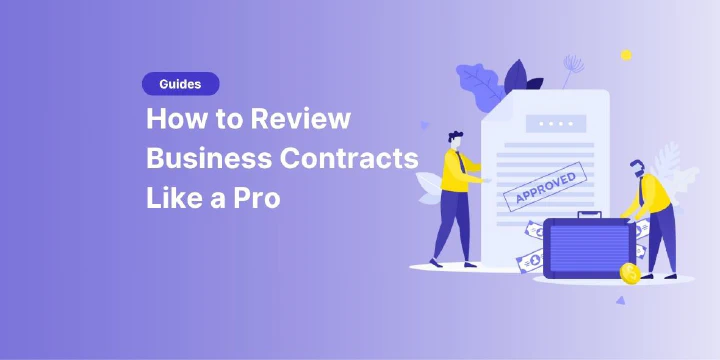Difference Between Contract and Agreement
Contract or agreement? If you’ve ever wondered what exactly the difference between an agreement and a contract is. While the two share similarities and overlaps, they also have important differences. In this article, we provide insights into the distinctions between agreements and contracts. With practical examples, key legal considerations, and answers to frequently asked questions, we offer a comprehensive overview and clear explanations.
- What is an Agreement?
- What is a Contract?
- Agreement Vs. Contract: What’s the Difference?
- Commonalities: Finding the Intersection
- Practical Examples: Agreements and Contracts in Real Life
- What We Learn From This
- Key Legal Considerations: Navigating Safely
- Avoiding Pitfalls
- Conclusion
- Frequently Asked Questions (FAQs)

Before we dive deeper, let’s pause for a moment and clarify each terms definitions so that we later better distinguish between contract and agreements.
What is an Agreement?
Definition Agreement
Imagine an agreement like a promise between friends. Perhaps you’ve promised your neighbor to look after his plants while he’s on vacation. This promise is based on trust and mutual understanding. In legal terms, an agreement is often similarly informal. It can be oral or written and essentially involves two or more parties agreeing on something. But here’s the catch: Not all agreements are binding or enforceable in the eyes of the law. It’s like a promise among friends – it relies more on honor and trust than on a legal obligation.
What is a Contract?
Definition Contract
A contract, on the other hand, is like a vow that’s put in writing. It has specific elements that need to be met for it to be legally binding. Think of a contract as a more formal agreement that meets certain criteria: There is an offer, acceptance of this offer, and an exchange of value (this can be money, services, or even a mutual promise). Contracts are the building blocks of business life and have clear consequences if they are broken. They’re like a recipe that must be followed exactly for the end result to be successful.
Agreement Vs. Contract: What’s the Difference?
Now that we’ve covered the basics, it’s time to look closer and discover the fine differences between an agreement and a contract. At first glance, they may seem similar, but the differences lie in the details.
1. Legal Binding: The Heart of the Difference
Agreements are often like promises based on personal trust. They can be informal, and not all agreements are legally binding. That means if your friend breaks his promise to look after your plants, legally there’s little you can do. It’s a matter of personal trust and integrity.
Contracts, however, are the serious commitments in the world of agreements. They are protected by law, meaning if someone does not fulfill their part of a contract, there are legal steps you can take. A contract is
like a security-sealed container for your plants – it offers protection and security.
2. Elements: Understanding the Building Blocks
For a contract to be valid, certain elements must be present:
- Offer: One party proposes something, e.g., a service or product.
- Acceptance: The other party agrees to the offer.
- Consideration: An exchange of values (money, services, promises).
- Agreement: Both parties agree to the terms.
- Legal Intent: The intention to create a legally binding agreement.
Agreements might contain some of these elements, but without all of them, it’s difficult to consider them as legally binding contracts.
3. Formal Requirements: The Packaging Makes the Difference
While agreements can be informal, including oral arrangements, contracts often require a specific form or to be put in writing, especially in important matters like buying a house or hiring an employee. It’s like sealing a letter – the form provides additional security and clarity.
4. Consequences of Non-compliance: The Safety Net
For agreements not considered as contracts, the consequences of non-compliance are often limited. It might lead to a loss of trust or a damaged relationship, but legal actions are harder to pursue.
Contracts offer a safety net. If a party does not adhere to the agreement, the other party can take legal action to demand compensation or enforce the fulfillment of the contract.
Commonalities: Finding the Intersection
Agreements and contracts share some core features, including:
- Involved Parties: Both agreements and contracts involve two or more parties coming together to achieve something.
- Consent: Both require some form of consent or agreement between the parties on what is to be achieved.
It’s like agreeing to start a project together with a friend. Both of you need to be on the same page before you can begin. The main difference lies in how formal this consent is and what legal steps can be taken if one of you does not stick to the agreement.
Practical Examples: Agreements and Contracts in Real Life
Now that we understand the differences between agreements and contracts, let’s look at some examples from real life. It’s like unrolling a map to see where these concepts lie in our everyday landscape.
Examples of Agreements That Are Not Contracts
- Neighborhood Help: You promise to bring in your neighbor’s mail while he’s on vacation. This is based on mutual trust, but there’s no legal obligation.
- Friendly Promises: A friend agrees to help you move. It’s a friendly gesture, but not one you can seek legal assistance for if he doesn’t show up.
These situations show how agreements are part of our daily lives, often without us realizing it. They are based on good faith between people.
Examples of Contracts in Real Life
- Employment Contracts: When you take a job, you typically sign a contract that outlines your role, salary, and duties. This contract protects both you and your employer.
- Purchase Contracts: When buying a house, you sign a contract that sets the purchase price, the property description, and the conditions. This contract is legally binding and enforceable.
These examples highlight how contracts provide a foundation for many of our most important and formal interactions.
Case Studies: The Difference Makes a Difference
Imagine Lisa and Tom plan to open a café together. They agree to share the initial investments, and Tom promises to take care of the business planning while Lisa handles the design. If they only have a verbal agreement and Tom decides not to proceed, Lisa might find she has little legal recourse.
Now, suppose they had put their arrangements into a written contract signed by both. In this case, Lisa would have legal means to pursue Tom should he fail to fulfill his obligations.
What We Learn From This
These examples and case studies show that the difference between an agreement and a contract can be significant, especially when things don’t go as planned. In the world of agreements and contracts, it’s often better to put in writing what has been discussed. It’s like capturing a beautiful moment with a photo – it provides a clear memory and security for the future.
Key Legal Considerations: Navigating Safely
When it comes to agreements and contracts, we enter the territory of legal considerations, which can sometimes seem as dense as a jungle. But don’t worry, we’re here to clear some paths and help you navigate this area safely. It’s like giving you a compass needle that shows the way.
The Importance of Understanding
- Knowledge is Power: Understanding what you’re signing or agreeing to is crucial. It’s like reading a map before you embark on a journey – it prepares you for what might come.
- Seeking Clarity: If you have doubts or something is unclear, don’t hesitate to ask questions. It’s better to clarify upfront than to grope in the dark later.
Validity and Enforceability
- Criteria for Validity: Not all contracts are created equal. Some require specific forms or must meet certain conditions to be valid. It’s like checking the ingredients in a recipe to ensure the result is a success.
- Understanding Enforceability: Even if a contract is valid, there can be circumstances where enforcement might be challenging. Know your rights and the potential hurdles that might arise.
Differences in Legal Jurisdictions
- Observing Local Laws: Legal requirements can vary from place to place. It’s similar to traffic rules that can change from country to country – it’s important to be aware of
local laws.
- Seeking Professional Advice: Sometimes, it’s best to consult legal counsel, especially for large or complex arrangements. It’s like bringing in an experienced guide when you venture into unknown territory.
Avoiding Pitfalls
To ensure you and your agreements or contracts stand on solid ground, here are some tips to avoid common pitfalls:
- Prefer Writing: Oral agreements are hard to prove. A written contract provides a solid foundation and clarity for all parties involved.
- Specify Details: Be as specific as possible in your agreements. Ambiguities can lead to misunderstandings and conflicts.
- Stay Realistic: Ensure that what is agreed upon is realistic and achievable. Overpromised can lead to disappointments and legal problems.
Conclusion
While dealing with agreements and contracts can seem daunting, with the right knowledge and tools, it’s possible to master them. By being aware of the legal considerations and taking proactive steps, we can protect ourselves and our interests. It’s like learning to swim safely before diving into deep waters – it prepares you to navigate with confidence.
The Importance of Understanding
We’ve seen how crucial it is to understand the difference between agreements and contracts. Agreements are like the informal promises that enrich our daily lives and are based on trust. Contracts, on the other hand, are the formal, legally binding arrangements that provide us with protection and security when we need it most.
Frequently Asked Questions (FAQs)
Below you’ll find some of the most frequently asked questions and their answers.
- Can a verbal agreement be a contract?
- Yes, in many cases, verbal agreements can be considered legally binding contracts, provided they meet the necessary conditions such as offer, acceptance, and consideration. However, proving a verbal agreement is often more challenging than with a written contract. It's a bit like trying to prove the word of one friend against another without a message or a witness.
- What happens if an agreement is not adhered to, but no formal contract exists?
- If no formal agreement exists and the criteria for a legally binding contract are not met, it can be difficult to initiate legal action. In such cases, solutions often rely on negotiations and the goodwill of the parties involved. It's like trying to resolve a misunderstanding with a friend without being able to fall back on rules.
- Do all contracts need to be in writing?
- Not all contracts need to be in writing to be valid. However, there are certain types of contracts that must be in writing to be enforceable, such as contracts for the sale of real estate or long-term lease agreements. Think of it as a safety measure – it provides clarity and protection for both parties.
- How can I ensure my contract is valid?
- To ensure a contract is valid, all required elements should be present: offer, acceptance, consideration, agreement, and legal intent. It's also advisable to put the contract in writing and have it signed by all parties. It's like following a recipe – if you follow all the steps, the result is likely to be successful.
- Can I back out of a contract if I change my mind?
- Backing out of a contract can be complicated and depends on the specific terms of the contract and the applicable legal provisions. In some cases, there are clauses that allow for withdrawal under certain circumstances, but there may be penalties or costs involved. It's important to understand the terms before signing and, if necessary, seek legal advice.
Please keep in mind that none of the content on our blog should be considered legal advice. We understand the complexities and nuances of legal matters, and as much as we strive to ensure our information is accurate and useful, it cannot replace the personalized advice of a qualified legal professional.

Table of contents
- What is an Agreement?
- What is a Contract?
- Agreement Vs. Contract: What’s the Difference?
- Commonalities: Finding the Intersection
- Practical Examples: Agreements and Contracts in Real Life
- What We Learn From This
- Key Legal Considerations: Navigating Safely
- Avoiding Pitfalls
- Conclusion
- Frequently Asked Questions (FAQs)
Want product news and updates? Sign up for our newsletter.
Other posts in Contract-Management

How to Review Business Contracts Like a Pro in 2025
When it comes to business contracts, what you don’t catch can hurt you. That’s why reviewing a business …

10 Best Contract Lifecycle Management Practices in 2025
Remember when closing a deal meant printing five copies, couriering them for “wet” signatures, then hunting …

How to Write a Contract Proposal (+Examples)
Imagine a freelance marketing consultant gearing up to pitch their services to a mid-sized tech company. …
Contracts can be enjoyable. Get started with fynk today.
Companies using fynk's contract management software get work done faster than ever before. Ready to give valuable time back to your team?
Schedule demo

